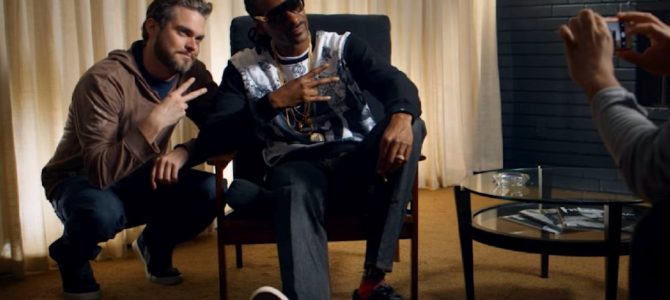
HBO’s latest documentary mini-series “The Defiant Ones” demonstrates how to “make it” in America, even if you’re plagued by the direst of circumstances. The film is a biographical expose on Andre “Dr, Dre” Young and his business partner, James “Jimmy” Iovine. In four one-hour episodes, director Allan Hughes details the exploits of these unlikely men from the mean streets of Compton, California and Brooklyn, New York into the high-stakes, high-reward business of music.
This documentary is both inspiring and depressing. One the one hand, we have a young black man born to a single mother in the notorious Los Angeles suburb of Compton. With very little chance to succeed otherwise, Andre begins to pursue his passion: music. Through that love, he virtually invents the “Hip-Hop DJ” concept, melting commonly known songs with an imported “beat track,” then “scratching” them to produce on-the-spot rhythmic creations never conceived before.
From that humble beginning, Dr. Dre went on to produce the likes of Eminem, The Black-Eyed Peas, and No Doubt (featuring Gwen Stefani). In collaboration with Iovine, Dre founded a retail company that produced high-quality yet affordable headphones, as well as setting up the prototypical music streaming service we all know today as “Beats Music.” In 2014, Apple Inc. purchased Beats Music for a little over $3 billion. Dr. Dre made it in the music business out of impossible circumstances. He made his widget, brought it to market, and did it better than anyone had before.
The same was true for Iovine. Having barely graduated from high school then dropping out of college, young Jimmy found himself at work in a music studio in New York. As fate would have it, Iovine found himself at the sound board in front of the famed Beatles front man John Lennon. Lennon immediately saw talent in this young sound engineer, which gave him quick credibility with his employers. Iovine stayed on to record the “Born to Run” LP for Bruce Springsteen, which launched his production career toward stardom and eventual partnership with Dr. Dre.
All the adversity these men had to overcome to achieve this level of success is inspiring. And make no mistake, Young and Iovine are bona fide geniuses. Genius always seems to find a way to success. From overcoming private petty differences (like Dr Dre leaking the Beats/Apple merger on Facebook) to defeating the once prolific “music sharing” scare, all the way back to overcoming humble beginnings, Young and Iovine are the epitome of the American Dream.
These Men Are the Few Lucky Ones
But now for the depressing part. For starters, most young black rap artists will not become the next Dr. Dre. They are all simply not going to fight their way up the rap freestyle battles to fame and fortune like Eminem did. And nearly all white college dropouts are not going to fall blindly into the dream job that’s going to solve all their financial problems.
What you don’t get when you’re watching a documentary like this are two facts: You’re not a genius, and you’re not that lucky. What’s depressing about a documentary like this is that people will take it as inspiration to go out and “follow their dreams” at all costs. Many want to believe this will bring them contentment, fulfillment, riches, and fame. What’s really sad is, even in the highly rare instances this does bring riches and fame, the contentment and fulfillment continue to elude most who have money and are a household name.
I have to admit I like Eminem’s music. I hate the content, but his style is mesmerizing. But I don’t love Eminem primarily because of his music, but because of quotes like this from this documentary: “To put food on the table, doing what I love to do, would be the ultimate goal.” If we take his words seriously, he’s just trying to be a man. If becoming a famous rap act is what it takes, he’ll do it. And if he gets famous and rich doing it, all the better.
Because of this film, I also admire Dr. Dre. In the last episode of the documentary, Dre says, “It’s not about who has the most jewelry…I want my kids to start on another level. I don’t want them to start in the projects.” Sounds like Dre is also just trying to be a man. Just like the rest of us.
Do What I Say, Not What I Do
But here’s the really screwed-up part. Dr. Dre knows what people want to hear. He knows he can profit from that. He knows that if he makes a profit, his family will benefit. He is using what he has to improve the circumstances of his family.
The question is, why won’t he share that with the rest of us, especially in the form of his art? Find me a Dr. Dre or Eminem or a Black Eyed Peas or a No Doubt song that lauds the virtues of being a dad who doesn’t abandon his children. One song that teaches a man to stay home, in spite of his “dreams,” and raise his sons to be the same kind of men. While I love them for trying to be real men, I hate them for not encouraging others to do the same.
That message simply does not sell. St. Paul poignantly teaches the young pastor Timothy, “For the time is coming when people will not endure sound teaching, but having itching ears they will accumulate for themselves teachers to suit their own passions, and will turn away from listening to the truth and wander off into myths.”
If I’ve gathered anything from this documentary, it is that the music business is not in the business of changing things. It is in the business of telling people what they want to hear. It is in the business of “scratching itching ears.” Tell people what they want with a hypnotic beat and a razor-sharp wit, and your record will go platinum. Deviate from that formula, and suffer the consequences. Ask yourself honestly. Do you think John Lennon wanted the concepts in “Imagine” to come to fruition, that his aim was to destroy the system that created his fame and wealth?
Our Definition Of Virtue Is Whack
So here’s a simple question. Why do we have to “make it”? We want to say, “I have arrived!” but why are we trying to “arrive”? And where do we hope to be when we “arrive”? What kind of people do we think we’ll be?
As I watched this film, I caught myself asking, “How can I be more like Dre?” Wrong question. The right question is, “Did all of this make Dre and Jimmy better men?”—better husbands to their wives, better fathers to their children. Does it inspire other young men to be good dads?
Well, for Young fortune was the remedy for being raised without a father in an impoverished and crime-ridden neighborhood. But almost no young black man being raised by a single mom will become Dr. Dre. The end of the film depicts Dre funding a new Compton High School, complete with a glamorous fine arts building. While it is inspiring to be sure, one day those buildings too will age, deteriorate, and get marked by gangs. No money can compensate for the loss of a million fathers.
The Truth Isn’t Always Sexy
I wonder what might happen if Dr. Dre invested millions of his dollars into helping impoverished men learn how to be good fathers. I also wonder what might happen if men stopped trying to “make it” in the eyes of people who don’t know them and started focusing on how they can be the best husbands and fathers they can be to those who do. That might involve being an international rap star, but most of the time it won’t. Raising children properly is most often a selfless task that nets no fame. Being a good man will probably never win you a Grammy award.
Being a music mogul can improve your situation and give your kids a better chance than you had. But often it won’t help. Deciding to be good man no matter what, however, works every time it’s tried. Even if that means you have to go to school to learn how to be a diesel mechanic and you hate it. If that’s what it takes, you’ll do it, because you’ve decided to be a man. You’re going to be a good husband and father because you’ve come to realize that a million Dr. Dres can never do what one man can simply by being a good father.
My favorite line from one of my favorite Star Trek movies goes, “Don’t try to be a great man; just be a man and let history make its judgments.” Friends, “being a man” is very simple but also, very hard. Often it involves setting your dreams aside in favor of taking care of your children. That just doesn’t fit very well into an Eminem rap song, does it? It’s not sexy. But it’s true.









